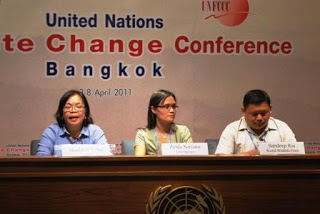
A press conference held today called for the 10 governments of the Association of Southeast Asian Nations (ASEAN) to work together more effectively as a bloc in the UNFCCC negotiations to push for the needs of the region’s 600 million citizens and towards low-carbon development. While acknowledging the differences in opinions amongst the ASEAN member governments, the speakers argued that the common excuse of national sovereignty is no longer acceptable, as climate change and its impacts do not recognize national borders; the main underlying problem is instead lack of political will.
Shalimar Vitan (Oxfam International) said that the biggest challenge is for ASEAN to move away from its image as a talk-shop and towards an effective institution with political will to make decisions on behalf of its 600 million constituents. Zelda Soriano (Greenpeace-SE Asia) echoed the need for a more collective ASEAN voice, saying that the impacts of individual ASEAN governments in the UNFCCC negotiations could be amplified if they spoke on behalf of the 10 ASEAN members. Noting that ASEAN already has a policy framework for greater engagement on these issues, particularly through the new ASEAN Charter adopted in 2007, the ASEAN Climate Change Initiative, and the ASEAN Working Group on Climate Change, she argued that there is no excuse for the lack of a strong, collective voice.
Sandeep Rai (WWF International) acknowledged that while Cambodia, Laos, and Myanmar are the only ASEAN members considered as Least Developed Countries under the UNFCCC, all 10 ASEAN countries are highly vulnerable to the impacts of climate change. He called for ASEAN to work as a negotiating bloc particularly on issues of adaptation and to push for a “loss and damage” mechanism to be finalized by COP18 in 2012.









